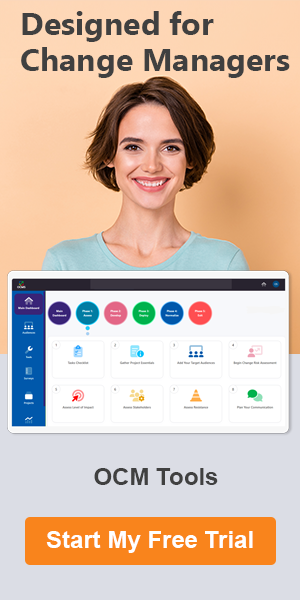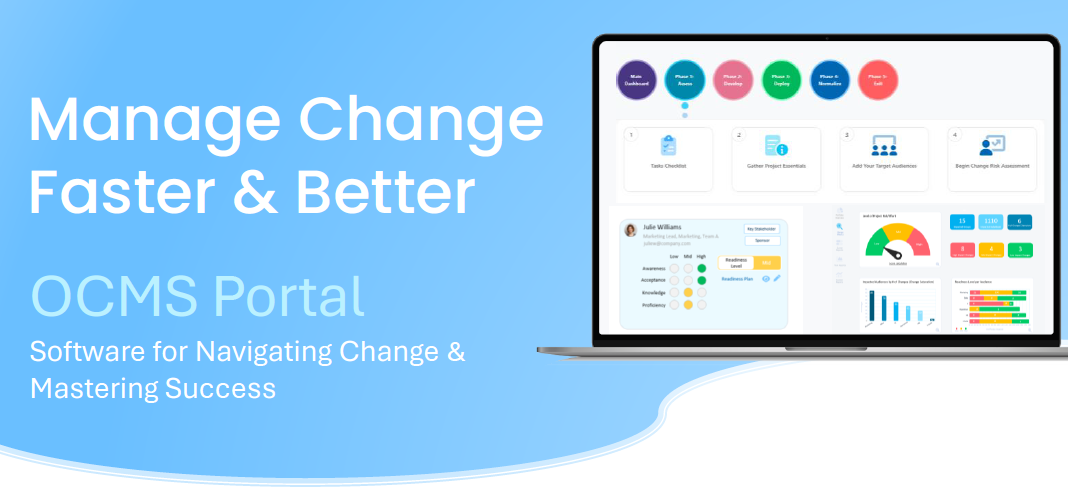Helpful Strategies for an Effective ERP Change Management Plan
“The best-laid plans of mice and men often go awry.” This timeless adage rings especially true when it comes to implementing Enterprise Resource Planning (ERP) systems. These robust digital frameworks promise streamlined processes, data integration, and operational efficiency.
Yet, despite their potential, many ERP implementations stumble and falter, leaving organizations grappling with frustration and unmet expectations.
Why does this happen? The answer lies not in the intricacies of code or the elegance of algorithms, but rather in the delicate dance between technology and human behavior.

ERP adoption hinges on human acceptance and commitment. It’s not enough to install software during an ERP system change; we must also cultivate a culture of enthusiastic adoption. This is the function of change management in ERP.
Change management for ERP implementation bridges the gap between technology and people. It ensures a smooth transition, fosters user adoption, and maximizes the benefits of the new system.
Watch a summary below:
Story Highlights
|
Why Focus on Change Management in ERP?
ERP systems often impact various aspects of an organization, from core business processes to daily workflows. Without proper change management, several challenges can arise:
- Employee Resistance: Change can be disruptive. Employees accustomed to existing processes often resist using a new unfamiliar system.
- Training Gaps: Inadequate training can leave employees feeling overwhelmed and ill-equipped to navigate the new ERP system change effectively.
- Productivity Drops: Change management and ERP adoption go hand-in-hand. Lack of support during an ERP change initiative can cause users to be less productive in the new system.
- Communication Silos: Lack of clear and consistent communication throughout the implementation process (part of an ERP change management plan) can breed confusion and anxiety among employees.
Do you have any questions about change management for ERP implementation or how to build an ERP change management strategy? Please reach out and let us know!
The Benefits of Effective Change Management in ERP
Investing in a robust change management plan for ERP implementation offers numerous benefits to the organization and its users. Here are several advantages of change management and ERP support.
Increased User Adoption
Effective training and communication programs empower employees to use the new system effectively. An ERP change management strategy drives higher adoption rates and maximizes the return on investment (ROI) of the ERP system.
Improved Efficiency
A well-trained workforce can leverage the new ERP system to automate tasks, streamline workflows, and improve overall business efficiency. This helps the ERP change project meet its goals to optimize business tasks.
Reduced Mistakes
The role of change management in ERP implementation includes support both before and after the ERP system change goes live. These practices help reduce mistakes in the new system, ensuring accurate and consistent data management.
Stronger Employee Engagement
A smooth transition with clear communication fosters a sense of ownership and engagement among employees, increasing their buy-in for the new ERP system change. A good experience with change management and ERP, also means employees will be more accepting of future organizational change initiatives.
Reduced Risk of Project Failure
By addressing potential challenges and managing resistance proactively, an ERP change management plan helps mitigate risks and increases the success rate of your ERP implementation.
Elements of a Successful Change Management Plan for ERP Implementation
Define Your Change Goals
Clearly outline what you want to achieve with the ERP system change implementation. This could include increased efficiency in specific departments, improved data quality, or enhanced collaboration across teams.
Identify Stakeholders
Create a comprehensive list of stakeholders impacted by the ERP implementation. They will be the audience for your change management for ERP implementation strategy.
This includes employees, managers, executives, and even external partners who interact with your systems.
Develop a Communication Plan
Tailor your communication strategy to different stakeholder groups. Utilize various channels like town halls, email updates, video messages, and training materials to keep everyone informed throughout the process. Communication is a key part of an ERP change management strategy.
Invest in Training
Develop comprehensive training programs that address the specific needs of each user group as part of your change management in ERP plan. Offer a mix of learning formats – in-person sessions, online tutorials, and on-the-job support – to cater to various learning styles.
Address Resistance Proactively
Anticipate potential concerns employees might have regarding the ERP change. Develop strategies to address their change resistance and anxieties, highlight the benefits of the new system, and provide clear channels for feedback.
Provide Support After Go-Live
The role of change management in ERP implementation doesn’t stop when the new ERP system is rolled out to users. This is a critical time when change management support will be needed to help users integrate the new system into their workflows. Offer additional training, mentoring, and other support (FAQs, video tutorials, etc.).
Monitor Progress and Adapt
Continuously monitor progress and user adoption rates throughout the implementation process. Be prepared to adapt your change management for ERP implementation training strategies or address unforeseen challenges as needed.
Please let us know if you have any questions or feedback about change management and ERP or how to use change management for EPR implementation success.
Change Management Tools and Resources for ERP Implementation
Several tools and resources can aid you in developing a successful change management and ERP implementation strategy:
- Change Management Methodologies: Frameworks like the OCMS Framework and ADKAR (Awareness, Desire, Knowledge, Ability, Reinforcement) provide structured approaches to guide your change management efforts.
- Change Management Tools: Look for change management platforms (like OCMS Portal) that offer features specifically designed to manage change, such as communication modules, task tracking, change impact reporting, and stakeholder management tools.
- Communication Platforms: Leverage internal communication platforms and collaboration tools to share updates, host Q&A sessions, and foster a sense of community throughout the change process.
- Change Management Consultants: Consider partnering with experienced change management consultants. They can provide guidance, develop a customized ERP change management plan, and facilitate workshops to prepare your organization for the transition.
Conclusion: Change Management and ERP Implementation
Change management in ERP is about more than just technology. It’s about understanding the human aspect of change and leading your organization through a smooth transition.
By focusing on clear communication, comprehensive training, and addressing employee concerns proactively, you can bridge the gap between technology and people. This empowers your workforce to embrace the new ERP system, maximize its potential, and ultimately drive the organization toward success.
All-Inclusive Change Management Software
OCMS Portal is the ERP of change management software. It includes all the tools you need to ensure your change management for EPR implementation goes off without a hitch.
Enjoy these awesome benefits:
- Intuitive Interface
- Structured change management process
- Streamlined Communication and Built-in Surveys
- Simplified Task Management
- Enhanced Collaboration
- Data-Driven Insights
- Automated Change Management Plans
OCMS Portal combines simplicity, power, and time-saving features, making it an invaluable ally for change managers and their teams.
FAQ: Change Management in ERP Initiatives
Why do some ERP implementations fail?
ERP adoption hinges on human acceptance and commitment. It’s not enough to install software during an ERP system change; you must also cultivate a culture of enthusiastic adoption. This is the function of change management in ERP.
What is the role of change management in ERP implementation?
Change management in ERP deployments ensures that the impacted stakeholders – the ones that will be using the new system – are properly enabled to adopt the changes successfully. Change management helps ensure project success through sustained and proficient user adoption of the ERP system change.
What are the benefits of an ERP change management plan?
Investing in a robust change management plan for ERP implementation offers numerous benefits to the organization and its users. These include increased user adoption, improved efficiency, reduced mistakes, stronger employee engagement, and reduced risk of project failure.
Note: Content on OCM Solution's ocmsolution.com website is protected by copyright. Should you have any questions or comments regarding this OCM Solutions page, please reach out to Ogbe Airiodion (Change Management Lead) or the OCM Solutions Team today. OCM Solution was previously known as Airiodion Global Services (AGS).
External Sources: stock.adobe.com




